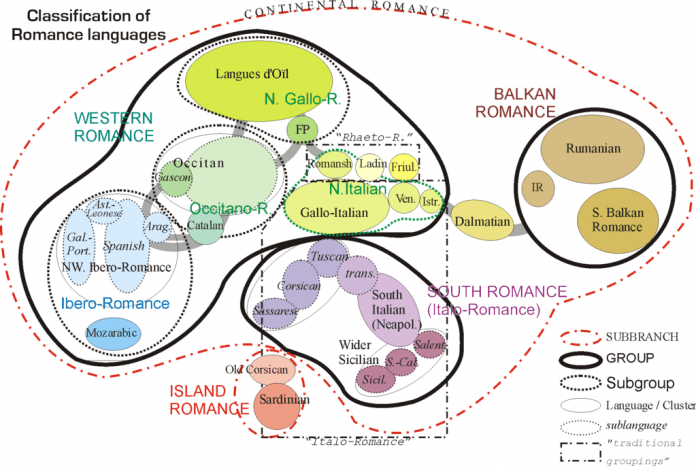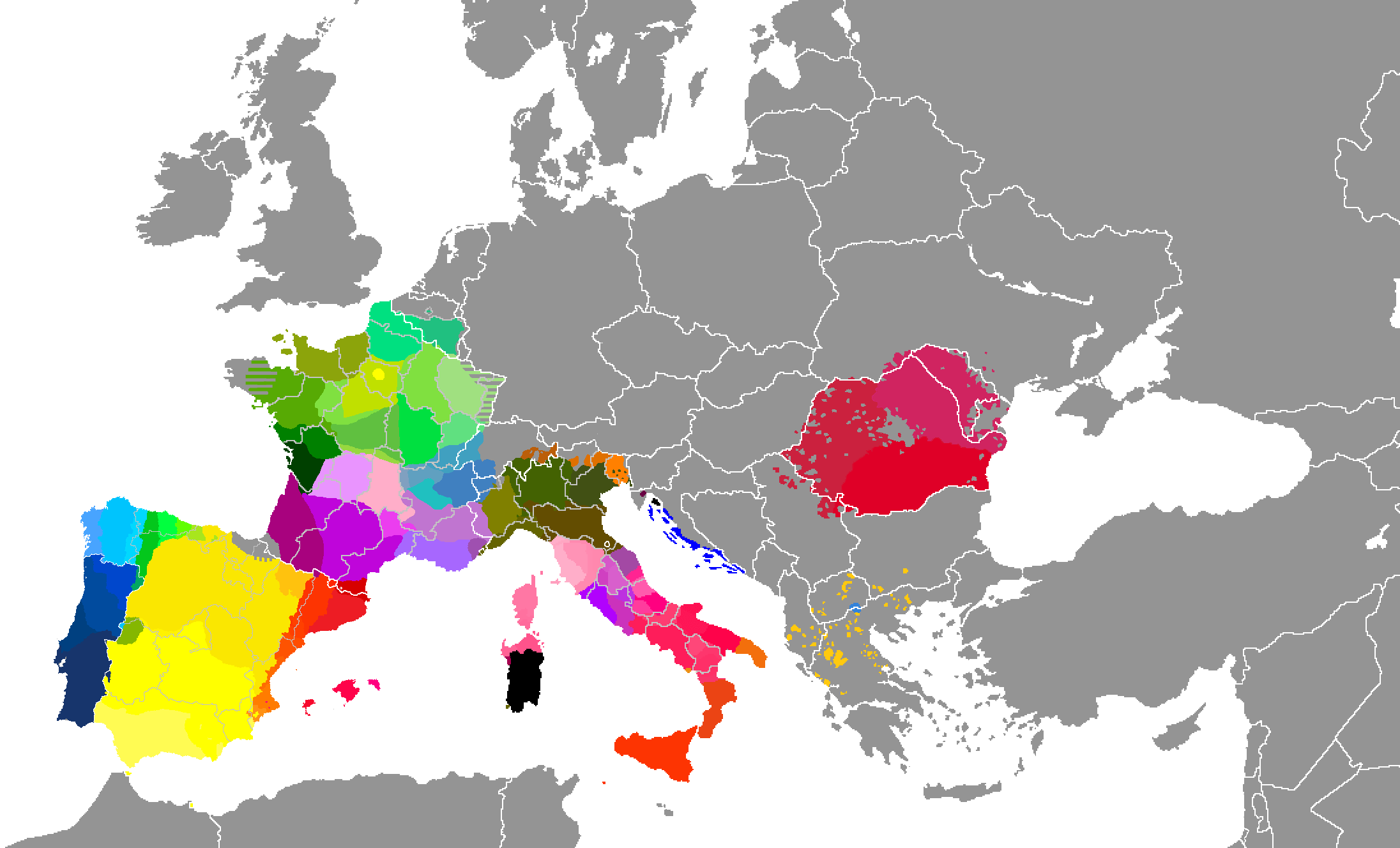
The Romance Languages
Romance languages and their name can make you faint just by listening to it!
Romance languages like Italian and French have a reputation for tempting you and being somewhat seductive but don't really get their name generally because of romantic connotations.
All Romance languages derive their meaning from the language of the Roman Empire which is:
- Latin
The influence of this Empire is still alive today, as almost one billion people speak a Romanic language as a native mother tongue and three hundred million more people speak a Romanic language as a second language. (bilingual communication).
Romance languages are an Indo-European branch of languages closely related to each other and which by history appreciated as an evolution of the vulgar Latin language and opposite the Classical Latin.
Romance languages are also called Romance languages, Latin languages, Neo-Latin languages or italic languages and are a branch of languages that relate perfectly to each other.
The italic languages were those that survived the Roman Empire, the falisco became extinct as the twin language of Latin (forgotten language) and also an italico group also disappearing to Latin-physisic languages such as osco-umbras and other disorderly derived branches of Latin.
The number of romance languages that are known exceed the top of 20 languages, today there are many ways of speaking, (dialects and jargons of each country derived from Latin) that are threatened with extinction and only a dozen of these languages have a specific general use and for several millions of speakers who practice these languages daily.

If we think of romance languages many fascinating languages can come to mind, there are many reasons why learning a language is fundamental and especially essential when you love languages.
Each romantic language has a word "romance" that produces images of passion or emotion but in itself, why are they called romantic languages?
The word "romance" comes from the Latin word "romant" which to its translation means "in the Roman way".
This is because some romance languages that can also be classified and called "Romanicas" were evolving in the passage of vulgar Latin.

Vulgar Latin refers to the speech that was common at the time, also known as "Sermo Vulgaris"This language used to be different from the classical Latin that was so used in literary works.As vulgar Latin had no official rules of spelling, punctuation or grammar, it was too easy for it to change and evolve in a short time.
The point was that being a colloquial way of speaking I did not have specific rules to speak it, even after time, some words are used so often that they officially become used in the language we use related to romance languages.Over the years, vulgar Latin evolved to become part of other languages linguistically related to each other as "romance languages" today.
Current languages with ancient history and roots

Each language is divided into families like human beings, by law parents have children, then age and die leaving a story and legacy through which they may have a chance of survival. Children languages (it is the languages that remain in the way of the old languages) marry and receive new influences or foreign movements from their new couples which causes a new language to exist or be born as a result of that union.
Romance languages are the current and modern languages that evolved from the vulgar Latin which is the colloquial language that is spoken in the Mediterranean region during and after the legacy of the Roman Empire. Some Romance languages may be:
- Spanish
- French
- Italian
- Portuguese
- Catalan

Despite a distant origin of Romance languages, romantic languages are as modern as ever. However, almost one billion people can speak at least one Romance language being "Spanish" the most spoken language with almost 500 million native speakers.
To learn a romance language there is a 50% better chance of learning them once at least one romance language of the same branches is mastered, in reality the romance languages are so similar that once you master one of them, you can have a basic base and roots to be able to learn the rest of them.
Roots

Romance languages and their learning is true that in some cases you can learn most of the languages deriving from Latin once a language belonging to the same family of these is handled, the Romance languages are classified into subdivisions and different branches.
Spanish and Portuguese are both Iborromaan languages that share many of their main features as something common, so it is easier to learn both languages without having to devote too much effort or time to the study of these. However, if a person speaks Spanish and learns Romanian (Romanian is a proto-Romanian language) it will always take more than time and much more effort than an iborroman time would need.
Romance languages and their learning is true that in some cases you can learn most of the languages deriving from Latin once a language belonging to the same family of these is handled, the Romance languages are classified into subdivisions and different branches.
Spanish and Portuguese are both Iborromaan languages that share many of their main features as something common, so it is easier to learn both languages without having to devote too much effort or time to the study of these. However, if a person speaks Spanish and learns Romanian (Romanian is a proto-Romanian language) it will always take more than time and much more effort than an iborroman time would need.
Why is Learning a Romance Language Important for the Future?

When a human being manages to learn a language or makes a considerable effort to do so it is one of the most rewarding challenges and the greatest pride of human beings, a huge challenge that needs to be faced. Many of the reasons for learning these languages are:
- Spanish: Learning Spanish allows you to visit many countries in Europe, West Africa and America to communicate with almost 600 million Spanish speakers. Spanish is a very common and important language today, more and more people are learning it even if it is a complex language in their grammatical structures.
- French: French is one of the most beautiful and difficult languages to pronounce while being considered as the language of haute cuisine, perfumes, fashion, art, theatre and dance, among other considerable aspects in French culture. French is also considered to lend many words that are used in this language during a "linguistic marriage"
- Italian: Learning Italian is quite useful and beneficial due to the great career opportunities in which you could get a job easily if you manage Italian at a level of managing to defend yourself and know how to speak, careers such as music, design, archaeology and general arts. Many companies internationally were founded by Italian owners or co-owners and are always looking for translators or employees who master Italian perfectly.
- Romanian: The Romanian language is one of the first major languages in the branches of Romance languages. In itself, Romanian is the closest and most vivid language today to "Latin" so whether you want to learn Romanian or call your attention could be a door to be open to get better opportunities for a job, explore the world of the Roman Empire and history through this complex language that you can dedicate yourself.
In the Middle Ages a literary movement also emerged that used only Romanic languages; this movement would idealize life for that moment by telling stories about knights, heroes and native legends from each region.
This type of literature was growing to introduce any kind of literary genre from love stories to fiction and sorcery, it is because of this that the word "romance" is associated with love relationships.

Romance languages are from the family of languages that are most spoken on planet earth. In a top of the 3 most spoken languages among the family of romance languages we have the:
- Spanish
- Portuguese
- French

Other languages are also known globally and there are many that are spoken and used by much smaller communities, closed towns or localities and to finish, languages that became extinct or stopped talking.
Currently it is impossible to be certain of how many languages exist.
Even so, even if there are discussions and disputes about the practice and success of a language, each romance language is worth being learned because we can enter among a branch of Romance languages that are both interesting and wonderful to learn!
I hope you enjoyed my content! :D
-Emmanuel
Subscribe today and get the latest notifications of new posts published by our team of professional writers!


